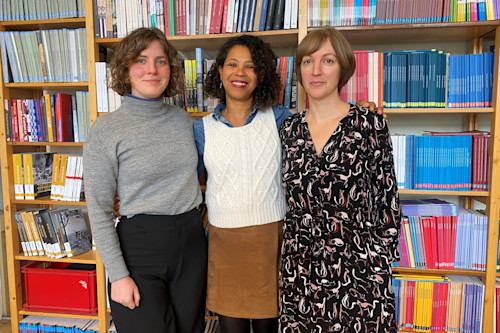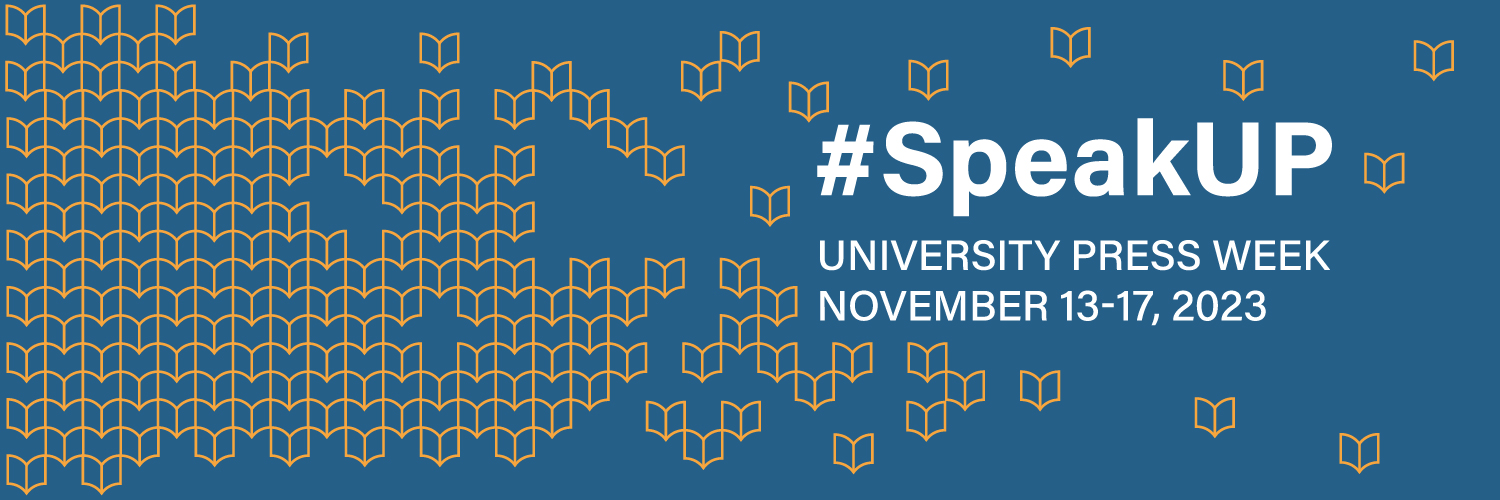What does #SpeakUP mean at AUP?

The University Press Week theme this year is #SpeakUP, celebrating the work that university presses do to reach new audiences, amplify unheard voices and publish ground-breaking research. Read Ilse Lazaroms and Maryse Elliott in conversation about what #SpeakUP means to them.
Anna: So, I think let’s start with the big question: what does #SpeakUp mean to you and your work at AUP?
Ilse: I think speaking up is about actively educating and talking to early career scholars from the publisher’s side. For me, as a previous scholar, it’s about taking down the invisible walls that surround academic publishing.
It's easy to forget that navigating the academic world is a skill, and not one that is taught everywhere. Through workshops and conversations, talking through best practices, do’s and don’ts, we can make a difference and encourage authors from different regions, backgrounds and fields to publish. There is such a sense within our team about the importance of this, and that global outlook is something that distinguishes us as a press.
Maryse: As editors, we direct the portfolio that is published, and in that role, we are instrumental in giving voice to scholars we want to be heard.
In the past, my film and media program has been very much Eurocentric and white. When I started working at AUP seven years ago I inherited a fantastic film list, but after a few years I looked it and thought, what about Asian cinema or media in Africa? We can publish more globally than this.
I also started looking at new topics, or fields that were exploring new terrains, like Migration Studies and more recently social justice. We have an editorial role – and responsibility – to create those venues for researchers. Often these relatively under published topics overlap with the age of the researcher, by working with younger scholars you end up publishing on more marginalised topics and vice versa. After that, the book does the speaking.
Ilse: As an editor, you're in a position of relative power – how do you use this?
The quality of a book is a given – we’re not about to walk an academic through how to write a book, necessarily, but we are going to encourage them to get a stronger proposal together, discuss the main tenets of their project and navigate funding opportunities, for instance.
 !
!
Anna: That takes extra effort to reach out, and to nurture young scholars through this personal relationship.
Ilse: Well, it’s a case of bringing your politics wherever you go. Sharing knowledge gives power to others – and it creates good book proposals. It's these one-on-one relationships that our editorial team fosters with authors and editors.
Maryse: Yes, and this outreach brings opportunities to scholars who perhaps haven’t encountered this in their academic or professional circle. So, you’re helping to even the playing field.
Anna: You’re both speaking at publication workshops in the coming months, can you talk about what your goals are for these workshops?
Maryse: When we organise these outreach workshops for researchers, we want to emphasise our commissioning editor relationships. We want to make the book publication process transparent, because publishing a book is a matter of trust from both parties. We invest our time and energy into authors because we want their ideas to be published. I think these workshops and conversations are how you change perceptions, and how you tell people how things work at AUP.
Ilse: We make it clear to researchers how everything works. I'm giving a workshop on December 5th at Radboud Institute for Culture & History about academic publishing. The workshop is about demystifying how to publish your first book. So, I'm speaking partially about my own experience as an academic, and also about the publication process at AUP. What the relationships look like with your editor and best practices on approaching publishers. That’s useful for contacting editors, at AUP and elsewhere.

Anna: Are there any recent titles, or book series, that you’re working on which you think shine a light on what we’ve discussed?
Maryse: Well, I've recently launched a new series Perspectives on the Maghreb – which is a collaboration between MECAM, the Merian Centre for Advanced Studies in the Maghreb and AUP. MECAM work with scholars in Tunisia. They approached us knowing that we are open-access oriented. We shouldn’t forget about open access – open access is another way that AUP speaks to the larger readership.
I'm doing a workshop for MECAM in Tunisia in February 2024, talking to scholars from the Maghreb region about publishing. This is a great example of the different types of partnerships we have... This kind of workshop isn’t just about the books we might publish, but the impact that we can have with early career researchers.
Ilse: I think these issues are always in the back of your mind when you’re doing your job. You know, when I relaunched the War, Conflict and Genocide Studies series, I thought – who do you invite for the academic board? That's where the network comes into play. We have a global board now, it widens not only our conception of war, conflict and genocide outside of Europe but this network trickles in new authors and volume editors from each of their respective fields. We also now have a majority female board, in what is seen as a typically male field. These kind of editorial decisions inevitably shift how we think about the topic. Part of academia and academic publishing is, what are these concepts that we’ve used for so long? Let’s look at them again. What do you think they mean?
Anna: So, this relationship-based dynamic gives space to look at topics from new perspectives?
Maryse: I had a similar experience with one of my series’ academic boards, where an academic approached me that it wasn’t diverse enough. I think we learn from each other.
Ilse: That’s what speaking up is – it's awareness and attention. From talking to young scholars about their cutting-edge research to working with and reevaluating topics and advisory boards with established academics, these are all different ways that we speak up.

